Shai Davidai Says Columbia Cleared Him. The University Disagrees
An investigation into Davidai's claim of full exoneration
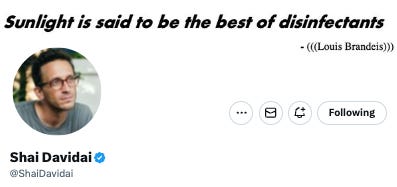
Shai Davidai, the former Columbia assistant professor who was the subject of a 20-month harassment investigation reportedly involving more than 50 complaints, claimed last Wednesday on X that the university had “finally admitted that I hadn't done anything wrong.” In Tablet, he wrote that the investigation was closed “with no findings of wrongdoing—HR-speak for ‘innocent.’” He told Jewish News that he had been “cleared of harassment.”
According to Columbia, none of these statements is true.
On Tuesday, a university official told Maryam Alwan, one of the student complainants, that Columbia did not admit Davidai had done nothing wrong, did not declare him innocent, and did not clear him of harassment. Rather, the official said unequivocally that the investigation was closed solely because Davidai no longer worked at Columbia, in accordance with its policy for cases involving former employees. (As for the terms of his departure, Davidai claims he left by choice—a narrative he now leans on as he advances his career as a public figure. The university says the decision was mutual.)1
Davidai based his claim of exoneration on ambiguous language in a letter he published from Columbia’s Office of Institutional Equity (OIE)—the body responsible for investigating discriminatory harassment—which stated that the case was “closed… without findings or conclusions of wrongdoing.” But a separate letter sent by OIE to several student complainants stated, as the university official later confirmed, that the investigation was “terminated without any determination” because Davidai was “no longer employed by the University.” Columbia’s refutation of Davidai’s claim came as a direct response to Alwan’s inquiry about this discrepancy.
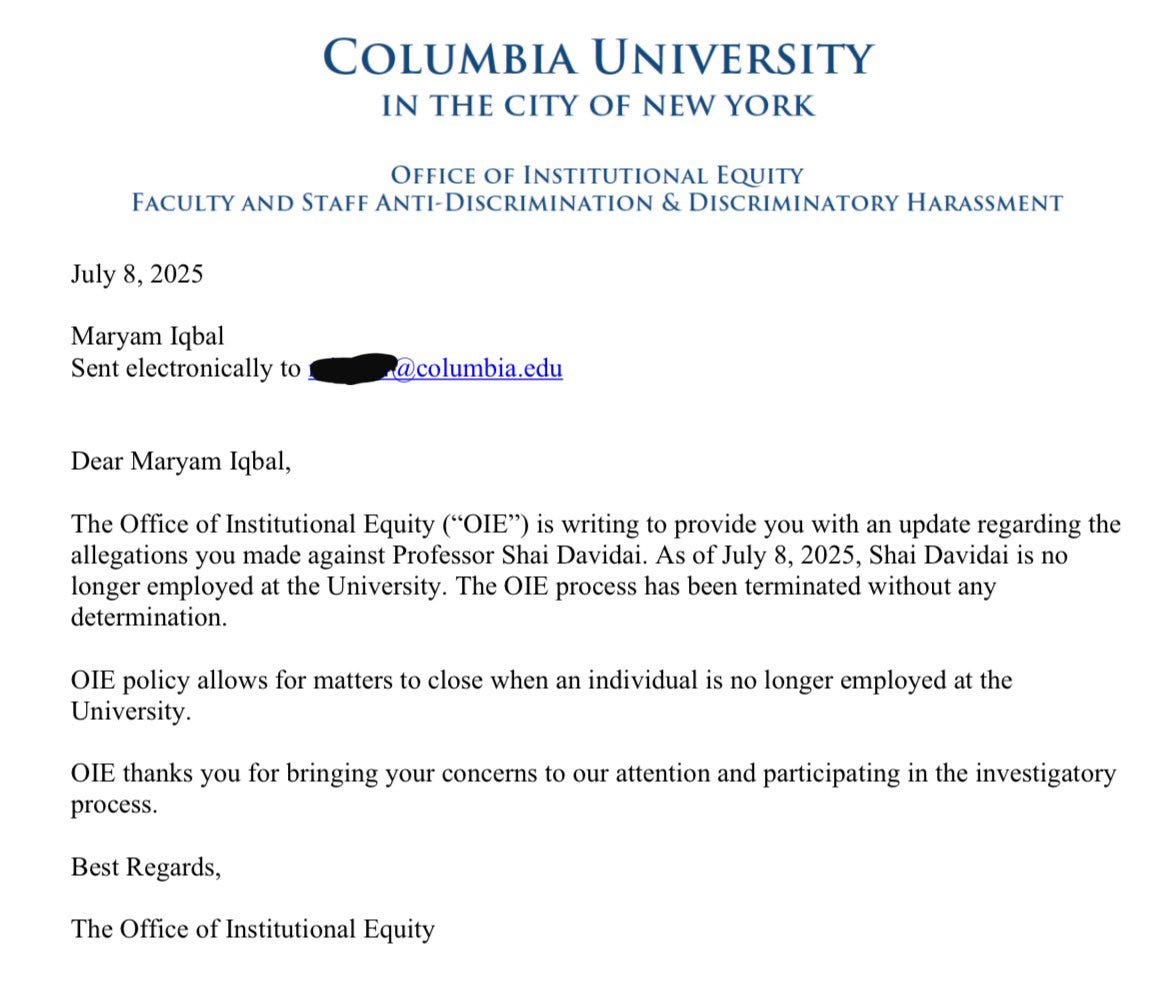
The OIE letter Davidai shared also misspelled the office’s name in the letterhead (“Instituitional”) and deviated from Columbia’s official formatting. That’s because OIE didn’t actually write it. While the office confirmed the letter as an authentic OIE document, the Columbia official acknowledged to Alwan that it had not been drafted in-house, despite being signed by the Vice Provost for the Office of Institutional Equity, Laura Kirschstein. This directly contradicts OIE’s claim on its website that it “is responsible for reviewing, investigating, and managing all incidents from inception through resolution” (emphasis mine). By contrast, the official confirmed that OIE had internally drafted the letter sent to students.

When I asked Davidai about the typo, he replied, “I don’t think it was sloppy. I have a feeling this was an intentional move by Columbia,” but offered no evidence. More likely, the errors reflect the level of scrutiny that Columbia’s OIE applied to reviewing a letter it had outsourced—one that appears to have been crafted to give Davidai plausible deniability while allowing the university to quietly shut down the case.
This aligns with a broader pattern of institutional risk management: rather than prioritizing the investigation or student safety, OIE appeared more concerned with avoiding further backlash amid mounting pressure from those accusing Columbia of harboring antisemitism, a cause Davidai had positioned himself at the center of. I reviewed email exchanges between several student complainants and OIE that revealed a consistent reluctance to address their safety concerns beyond procedural formalities, with little apparent concern for their well-being.
In at least two incidents, students sought No Contact Directives from OIE in response to Davidai’s persistent doxxing and targeting on social media—including defamatory replies and quote tweets that often triggered threatening messages—but the office declined, stating that his posts did not constitute direct contact. When Maryam Iqbal, a 19-year-old undergraduate student, followed up with a screenshot showing Davidai addressing her directly on X—“you are an antisemite who supports a terrorist organization”—OIE didn’t respond.
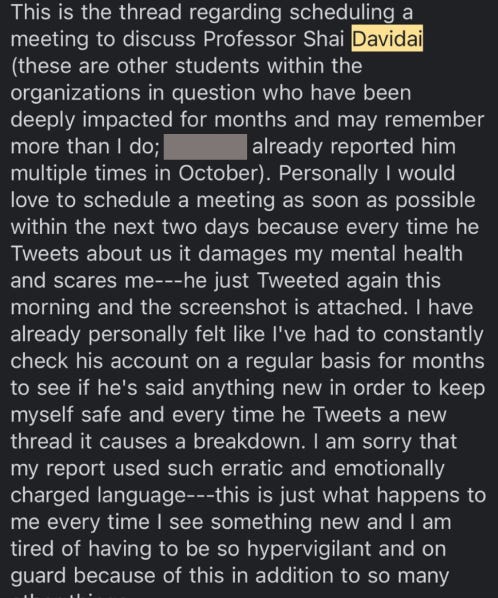
In another case, OIE declined to issue a No Contact Directive after Layla Saliba, a 24-year-old Palestinian American student at Columbia’s School of Social Work who had fourteen family members killed by the IDF in Gaza, told the office she was “terrified” by Davidai’s repeated posts about her on X, ignoring multiple pleas to “leave me alone”—posts that led to people recognizing and confronting her on campus. When Saliba blocked Davidai, he contacted her through her Columbia email to offer condolences for her grandmother’s death—a message she saw as manipulative, a violation of the boundary she had clearly drawn, and a chilling reminder that he was still monitoring her social media even after being blocked. Only then did OIE issue a No Contact Directive, but Davidai continued posting baseless allegations about her on X, calling Saliba a “pro-Hamas student leader” and sharing a post from another account that urged the dean of her school to block her graduation because she “justifies the kidnapping, murder, rape and dismemberment of Jews.” OIE’s strongest response was to tell her it had “conveyed to Professor Davidai that his behavior on social media as directed towards you needed to stop,” and advised her to contact Public Safety if she felt in danger.
(Columbia’s OIE and Public Affairs declined to comment for this article. Davidai confirmed the authenticity of the OIE letter, told me I was “going after the wrong guy” and that he was “not the bad guy here,” and offered his theory about the typo, but declined to comment on any other details of the story.)
"I’ve been arrested twice, interim suspended twice, evicted twice, suspended for an entire Fall semester, put on a year of disciplinary probation, and chemically attacked by Israeli soldiers all in the time they took to do this sham investigation."
—Maryam Iqbal, who was 18 when she first reported Davidai to OIE for targeting her online
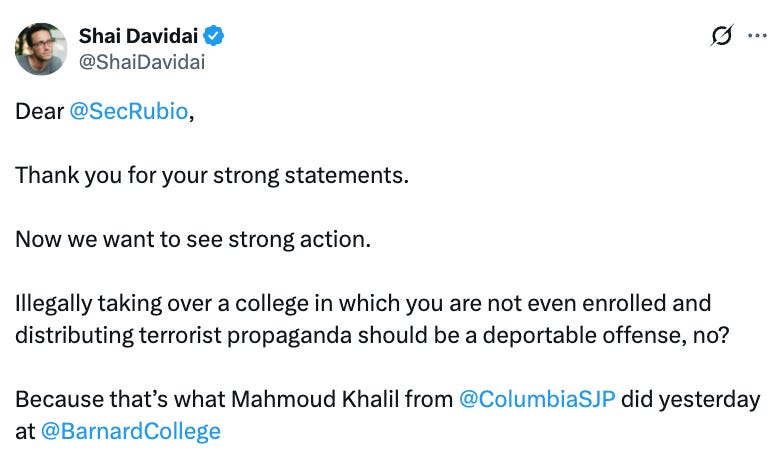
As Davidai continues to raise his public profile—announcing a podcast, live talks, and a book—buoyed by bogus claims of exoneration and profiting from a demonstrably false narrative, Columbia’s silence only deepens the harm to those who came forward. For the students who endured nearly two years of online targeting during a stalled investigation, the university owes them, at the very least, a public acknowledgment of what it has already admitted privately: Davidai exited Columbia with dozens of harassment complaints left unresolved.
Davidai’s temporary suspension from campus in Fall 2024 came after he “repeatedly harassed and intimidated University employees.” It was not related to his alleged harassment of students.

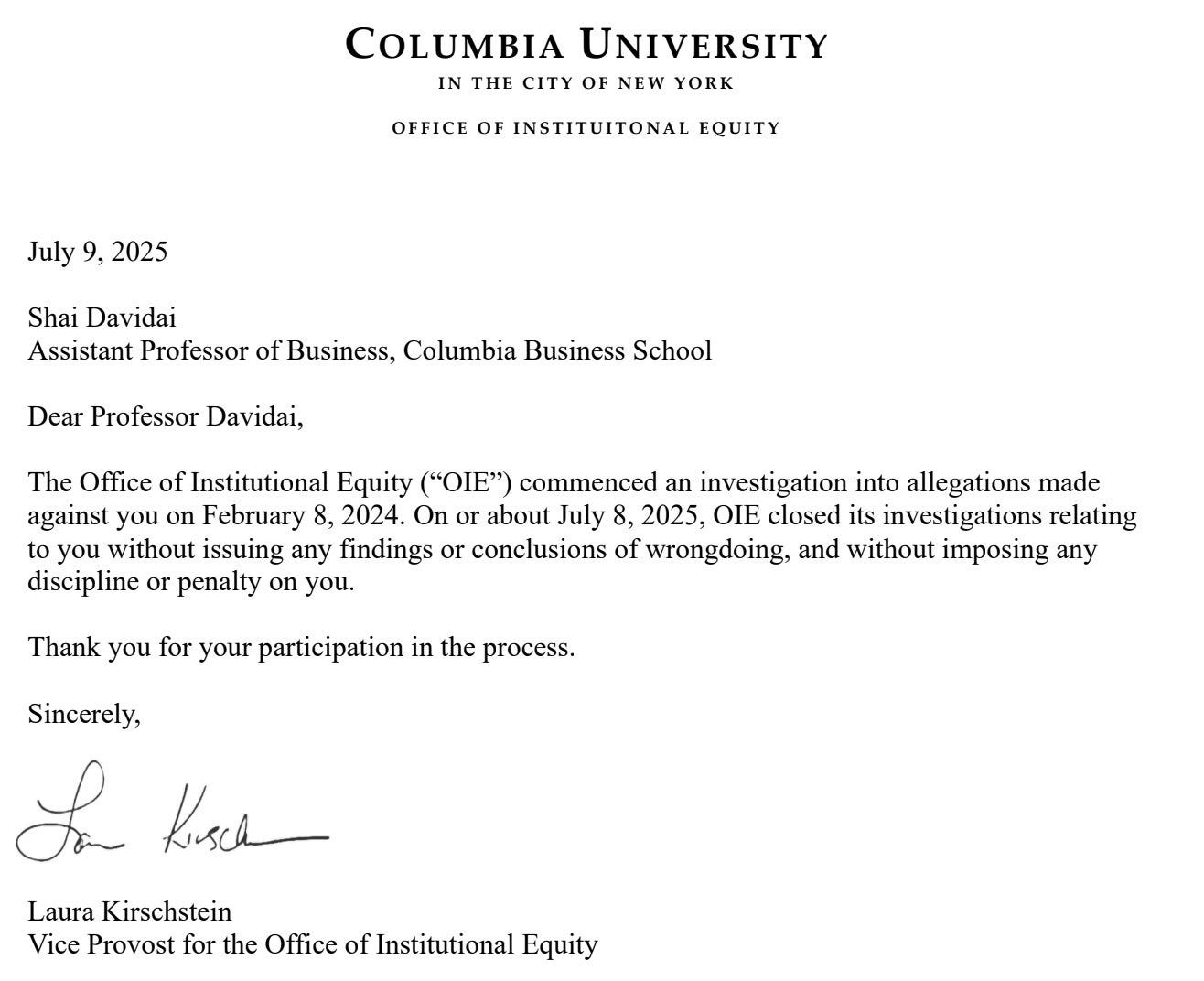

This confirms one thing that Columbia University itself has backchannels circumventing the "official" due process channels set up for the plebs.
Am I the only one bewidered that this Laura lady signed off of something that wasn't approved. I am just a peasant property manager, but I don't sign off in things unless my boss approves it (if approval is required). Great job Jasper. 👀